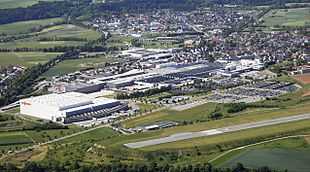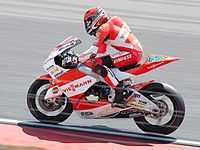Viessmann
 | |
| GmbH & Co KG | |
| Industry | HVAC |
| Predecessor | Hans Viessmann |
| Successor | Martin Viessmann |
| Founded | 1917 |
| Founder | Johann Viessmann |
| Revenue | 2.1 billion € (2013) |
Number of employees | 11,400 (2013) [1] |
| Slogan | climate of innovation |
| Website | www.viessmann.com |

The Viessmann Group is an international heating systems manufacturer headquartered in Allendorf (Eder), Germany. The group controls 27 production and project management divisions in 11 countries, its products are available in 74 countries, owns 32 subsidiaries and 120 sales offices around the world. Viessmann is a major winter sport and motorsport sponsor.
Profile
The company was founded in Hof an der Saale in 1917 by Johann Viessmann, and has been family owned for three generations. The President and CEO today is Dr. Martin Viessmann. As of 2013 the company employs 11,400 people and reports annual sales of € 2.1 billion. Today Viessmann provides an extensive range of HVAC products.
- Condensing technology oil and gas systems
- Solar thermal systems
- Photovoltaic systems
- Heat pumps
- Biomass heating systems (wood)
- Combined heat and power generation (CHP)
- Biogas systems
- Fuel cell systems
- Ventilation and Air-conditioning equipment
for commercial, industrial, and residential purposes ranging from 1.5 to 120,000 kW.
History
The Viessmann Group originated in Hof on the banks of the Saale, where Johann Viessmann set up a small workshop in 1917 specialising in the construction of steel boilers. In 1937 he moved operations to Allendorf (Eder) in northern Hesse. After WWII, Hans Viessmann took over his father's company and modernized it by introducing series production and industrial processes. In the 1950s and 1960s, oil replaced the previously used solid fuels, whilst steel boilers became increasingly important. Viessmann seized these growth opportunities and developed into a medium-sized industrial enterprise with 1,400 employees.
The 1970s were a time of expansion. In 1972, Viessmann opened its first foreign factory in Faulquemont (France), followed by Waterloo, Ontario (Canada), the first site outside Europe, in 1978. With the development of new technologies, the company responded to the challenges of the energy crisis: In 1976, the first solar collectors were produced, followed by the first heat pumps in 1978.
The fall of the Berlin Wall in 1989 opened up new markets – initially in the former East Germany and later in Eastern Europe. At the end of 1991/start of 1992, Dr. Hans Viessmann handed the company over to his son Dr. Martin Viessmann.
In the 1990s, major structural changes were taking place: from floorstanding boilers to wall mounted boilers, from oil to gas, from gas-fired boilers to condensing technology. Viessmann set up a new production facility for wall mounted gas boilers in Allendorf, whilst developing an international sales office and branch network. As of 2005, the company launched the "Efficiency Plus" campaign focusing on demonstrating energy saving and sustainable processes and reducing the company's environmental footprint, whilst also expanding the product range with the acquisition of other technologies. Viessmann first acquired wood combustion specialists Mawera and Köb, followed by KWT, a manufacturer of large heat pumps and ESS for combined heating and power systems. BIOFerm, Schmack and Carbotech acquisitions covered the area of biogas technology, and with an evacuated tube solar collectors plant in Dachang (China), the company has expanded its market presence into solar thermal systems.
Following the introduction of the company's "Efficiency Plus" campaign, Viessmann received both in 2009 and 2011 the German Sustainability Award for most sustainable production and most sustainable brand in Germany, respectively. In 2010 the company also received the Energy Efficiency Award for optimising energy production and use in its manufacturing facilities.[2][3]
Viessmann Academy
The Viessmann Academy was unofficially established by the company in the 60s, in order to meet the ever growing demand for training and expertise of employees and trade partners, which was reflecting the constant expansion of the technological spectrum of modern HVAC systems. Today, the Viessmann Academy, with its new facilities located in Allendorf (Eder) provides a comprehensive programme of basic as well as advanced training courses for HVAC contractors, planners, architects, property developers, flue-gas inspectors, education institutions and Viessmann's own employees, in total of more than 92,000 industry specialists each year.

Sports
Viessmann is a major sponsor of such winter sports as biathlon, bobsleigh, cross country skiing, luge, Nordic combined, skeleton, and ski jumping. Among the athletes sponsored are Andrea Henkel, Alexander Wolf, Evi Sachenbacher-Stehle, Axel Teichmann, Eric Frenzel, Tatjana Hüfner, Felix Loch, and Michael Uhrmann.
Viessmann is also sponsoring the Grand Prix motorcycle racing team Kiefer Racing, with which rider Stefan Bradl won the Moto2 2011 world championship.
See also
References
- ↑
- ↑
- ↑ "Deutscher Nachhaltigkeitspreis". Deutscher-nachaltigkeitspreis.de. Retrieved 4 January 2015.